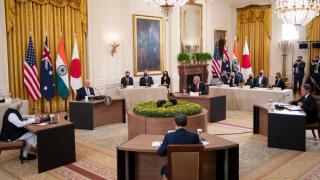The Biden administration has repeatedly vowed that it is “intensifying” its focus on the Indo-Pacific region and working to “revitalise” the United States’ network of regional allies and partners.
But even before the war in Ukraine, it was struggling to act on this agenda with the urgency required. Biden’s Indo-Pacific strategy now faces the very real prospect of being sidelined by America’s proxy war with Russia and renewed focus on European security.
If Washington is serious about upholding a favourable balance of power in the Indo-Pacific, it must find ways to balance its focus in Europe and Asia at once and invest more decisively in strengthening its strategic position in the Indo-Pacific.
Despite the Biden administration’s recognition that “what happens in the Indo-Pacific will, more than any other region, shape the trajectory of the world in the 21st century,” its foreign policy bandwidth over the past year has been largely absorbed by policy reviews, global summitry, and crisis management in the Middle East and Europe.
The White House has advanced some important Indo-Pacific objectives, such as settling host arrangements for US forces in Japan and South Korea, reviving a visiting forces agreement with the Philippines, convening the first in-person leaders’ meeting of the Quad, and expanding the Australia-US Force Posture Initiatives on their 10th anniversary.
But most of these actions were about correcting the course of US policy after four years of Donald Trump, rather than advancing new and tangible strategic priorities.
Fortunately, Biden’s foreign policy team recognises that restoring US policy to its pre-Trump status quo isn’t enough to secure a favourable balance of power and influence in the Indo-Pacific. To advance a more ambitious strategy, the administration has begun, with some success, to revise the United States’ approach to empowering key regional allies.
Trilateral cooperation
Last year’s establishment of the Australia-United Kingdom-United States (AUKUS) defence technology partnership and its promise to deliver Australia a fleet of nuclear-powered submarines was the high point of this effort. Alongside a wider agenda for trilateral cooperation on emerging defence technologies, the AUKUS partnership heralds a long-term commitment to Australia and the Indo-Pacific balance of power – even as it has complicated the allies’ regional diplomacy and been criticised for its vague near-term agenda.
The AUKUS partnership is emblematic of wider challenges the United States faces in trying to reconcile future-oriented policy reforms to compete with China with timely and tangible steps to bolster America’s regional position today.
The Indo-Pacific remains underrepresented in the distribution of US attention amid competing global priorities. Biden carried through with his promise to withdraw US forces from Afghanistan and end combat operations in Iraq. But these decisions haven’t led to a substantial re-focus on the Indo-Pacific. And the president now finds himself deploying additional US troops to NATO countries in Eastern Europe.
Just as concerning from an Indo-Pacific perspective is that initiatives designed to mobilise US resources for the region – like the Pentagon’s Global Force Posture Review – have not taken decisive steps to prioritise deterrence vis-à-vis China and bolster military posture in the region.
The most glaring failure in the administration’s approach to the Indo-Pacific is the absence of an effective economic strategy. With the Regional Comprehensive Economic Partnership (RCEP) entering into force and China applying to join the Comprehensive and Progressive Agreement for Trans-Pacific Partnership (CPTPP), the US now sits outside the region’s most important trade blocs.
Hard limits
The White House insists that an Indo-Pacific Economic Framework is in the offing. But the collapse of the free trade consensus in US politics will impose hard limits on the framework’s attractiveness in the region – undermining Washington’s ability to compete with the primary source of Chinese geostrategic influence.
All is not lost. Despite its shortcomings, Biden’s first year in office yielded important resets with allies and partners, streamlined strategic policy processes, and laid the groundwork for ambitious long-term initiatives. The next three years must focus on implementing promising initiatives like AUKUS and other alliance reforms, fixing Washington’s trade policy settings and export control regime, and making big investments in force posture and capabilities that will advance a competitive US strategy.
This is what Biden’s foreign policy team says it wants to achieve. Senior officials continue to promise the administration views the Indo-Pacific as its “priority theatre” even as attention and resources are drawn to Eastern Europe. Forthcoming US strategy documents, like the delayed National Security Strategy and National Defence Strategy, should provide a clearer outline for how the White House will balance its global strategic priorities. But these must be accompanied by substantial investments in regional defence, diplomacy and trade if the administration’s Indo-Pacific goals are to be translated into reality.
This will be tricky if America’s large but overstretched defence budget is called on to pay for enduring commitments in Ukraine and Eastern Europe. Efforts to bolster US Indo-Pacific posture, like the Pacific Deterrence Initiative, are systematically under-funded relative to their European or Middle Eastern equivalents. And the defence budget is simply insufficient to sustain a force that can fight two great powers at once.
To help make the case for why Washington should carry out its Indo-Pacific commitments amid the fighting in Europe, regional allies and partners should contribute what they can to support Ukraine and ensure global cooperation against Russia’s aggression.
But when push comes to shove, it is Biden’s Indo-Pacific agenda that will run into trouble if America baulks at tough strategic choices. To uphold a favourable balance of power and influence in what the administration defines as the world’s most consequential region, Biden will have to personally champion US Indo-Pacific strategy.





